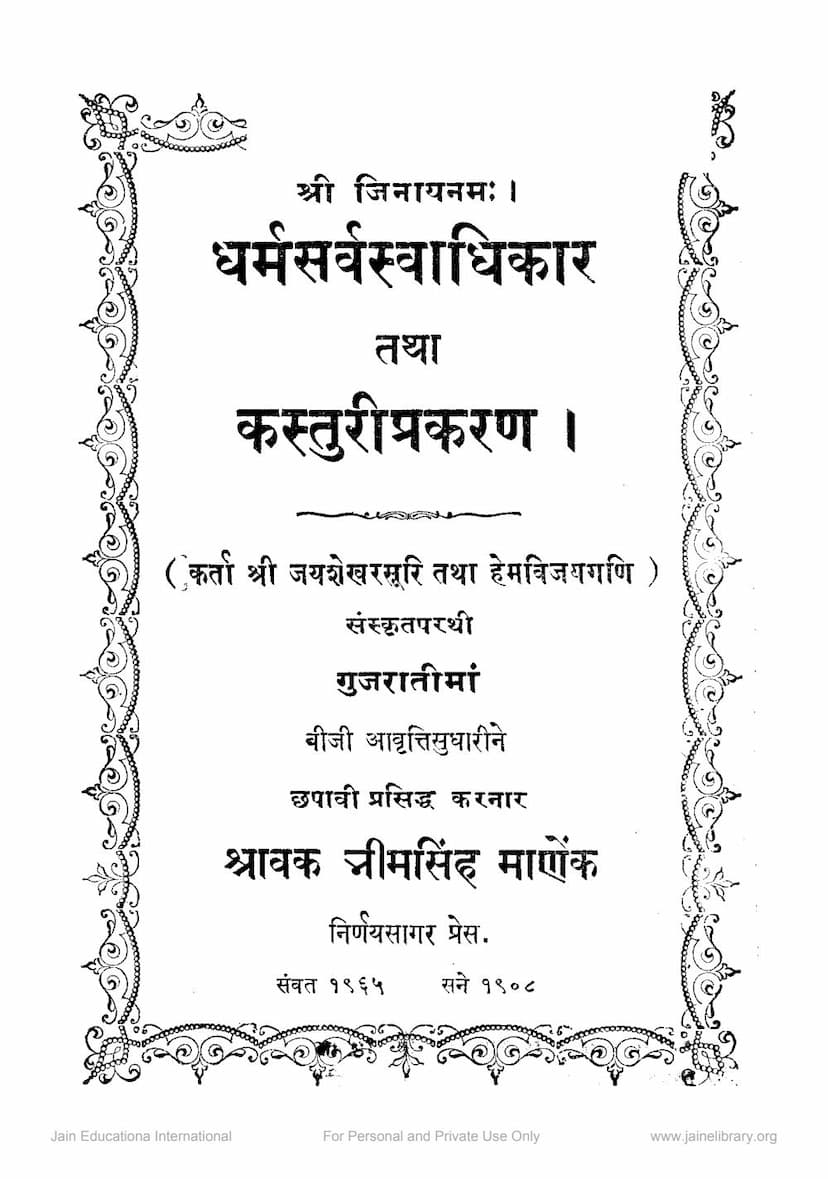Dharm Sarvasvadhikar Tatha Kasturi Prakaran
Added to library: September 1, 2025

Summary
The Jain text "Dharm Sarvasvadhikar tatha Kasturi Prakaran" by Shravak Bhimsinh Manek, published in 1908, is a compilation of two significant Jain works. The primary goal of this publication was to make these valuable Jain scriptures accessible to the Gujarati-speaking community.
Dharm Sarvasvadhikar (The Essence of Dharma):
This section, authored by Acharya Shri Jayasekhar Surishwar, is a profound discourse on the core principles of Jainism, particularly emphasizing the virtue of Ahimsa (non-violence). The text draws extensively from ancient Jain scriptures, Puranas, Smritis, and the Bhagavad Gita to highlight the Jain perspective on:
- The Paramountcy of Ahimsa: The text asserts that Ahimsa is the root of all Dharma, and its importance is paramount. It criticizes animal sacrifice and other forms of violence, even in the context of rituals and sacrifices.
- Ethical Conduct and Virtues: It delves into the merits of truthfulness, non-stealing, charity, celibacy, forgiveness, contentment, and righteousness.
- Prohibitions and Their Rationale: The book elaborately discusses the ill effects of consuming meat, roots, and honey, as well as the prohibition of night-time meals and the use of unfiltered water. It explains the underlying reasons for these prohibitions, often emphasizing their connection to non-violence and purity.
- The True Nature of a Brahmin: The text offers a definition of a true Brahmin not based on birth but on virtues like forgiveness, compassion, charity, truthfulness, knowledge, and self-control. It criticizes those who, despite being born into Brahmin families, engage in sinful or unethical practices, categorizing them as lower than even Sudras.
- The Significance of Self-Control and Austerity: The importance of controlling the senses (Indriya Nigraha) and practicing austerity (Tapas) is highlighted as crucial for spiritual progress.
- Critique of Ritualistic Practices Without True Understanding: The book emphasizes that external rituals without internal purity and ethical understanding are futile. True devotion and spiritual merit come from cultivating inner virtues.
- The Interconnectedness of Actions and Consequences: The text often refers to the Mahabharata's Shanti Parva, drawing parallels and lessons from philosophical discussions, often framed as dialogues with Yudhishthira, to illustrate the karmic consequences of actions.
Kasturi Prakaran (The Musk Episode):
This section, authored by Shri Hemvijay Ganiji, is a collection of verses that are described as melodious, adorned with literary devices, and insightful. While the provided text doesn't detail the specific themes of the Kasturi Prakaran, it is presented as a valuable collection of teachings for a wider audience. The publisher mentions it is presented in a refined Gujarati translation.
Overall Purpose and Significance:
Shravak Bhimsinh Manek's decision to publish this compilation aimed to:
- Promote Jain Teachings: To spread the profound ethical and spiritual teachings of Jainism, particularly the emphasis on compassion and non-violence, to a broader audience.
- Counter Misconceptions: To address potential misconceptions that might arise from external observations of other religious practices, by showcasing the rich philosophical and ethical depth within Jainism.
- Provide Accessible Knowledge: To make these Sanskrit texts understandable by providing a clear Gujarati translation, acknowledging that not everyone may have access to or proficiency in Sanskrit.
In essence, "Dharm Sarvasvadhikar tatha Kasturi Prakaran" serves as a testament to the Jain emphasis on non-violence, ethical living, self-discipline, and the pursuit of true knowledge, presented in an accessible format for the Gujarati-speaking community of its time.